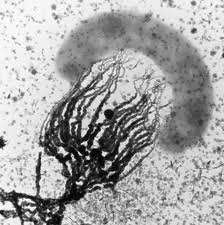
Iron bacteria are a bacterium that actually eats or ingests iron. They are a large diverse group of bacteria that have a significant effect on water treatment and distribution systems. Iron bacteria derive their energy (to grow) from oxidation of the soluble Ferrous Iron (which is present in groundwater) to the insoluble Ferric form. Only a small amount of energy is produced from this reaction, therefore Iron Bacteria have to oxidize large amounts of iron in order to grow. The result is an accumulation of Iron Precipitates along with Bacteria that form into Biofilms that excrete “slime”. This “slime” enables the Iron Bacteria to attach to surfaces such as pipes and pumps. Iron Bacteria causes restricted well performance from the plugging of groundwater extraction as well as the clogging of well parts including screens, casing, inlets etc.
The blocking of these components can be extremely rapid, especially in carbon tanks and carbon filters. They reduce the flow of wells to below operational requirements in a short period of time. In some cases it can cause pump burnout or the complete obstruction of components and prevent water flow completely. This of course, increases the cost of repairs, plumbing and maintenance.Iron Bacteria can also cause other problems such as corrosion of plumbing, turbidity, odor, and staining of water (which is usually red, orange or brown). Disinfection with copper-silver ionization is likely the most ecofriendly and biologically safe method.
